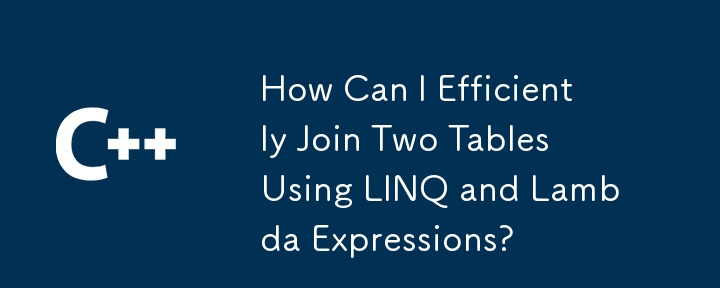Home >Backend Development >C++ >How Can I Efficiently Join Two Tables Using LINQ and Lambda Expressions?
How Can I Efficiently Join Two Tables Using LINQ and Lambda Expressions?
- DDDOriginal
- 2025-01-28 16:26:12765browse

Mastering LINQ and Lambda Joins: A Practical Guide
A common challenge for developers working with LINQ and Lambda expressions is efficiently joining two tables. This often leads to errors. Let's examine a problematic example and explore effective solutions.
The following LINQ query, while attempting a join, contains errors:
<code class="language-csharp">int id = 1;
var query = database.Posts.Join(
database.Post_Metas,
post => database.Posts.Where(x => x.ID == id),
meta => database.Post_Metas.Where(x => x.Post_ID == id),
(post, meta) => new { Post = post, Meta = meta }
);</code>
The issue lies in the post and meta selectors within the Join method. These selectors should directly reference the primary and foreign keys, not execute additional queries.
Solution 1: LINQ Query Syntax (More Readable)
For improved clarity, especially for beginners, the LINQ query syntax offers a more intuitive approach:
<code class="language-csharp">var id = 1;
var query =
from post in database.Posts
join meta in database.Post_Metas on post.ID equals meta.Post_ID
where post.ID == id
select new { Post = post, Meta = meta };</code>
This approach clearly shows the join condition (post.ID equals meta.Post_ID) and the filtering (where post.ID == id).
Solution 2: Lambda Expressions (Extension Methods)
If you prefer the conciseness of Lambda expressions, here's the corrected version using extension methods:
<code class="language-csharp">var id = 1;
var query = database.Posts // Start with the "from" table
.Join(database.Post_Metas, // Join with the "join" table
post => post.ID, // Primary key for "from" table
meta => meta.Post_ID, // Foreign key for "join" table
(post, meta) => new { Post = post, Meta = meta }) // Selection
.Where(postAndMeta => postAndMeta.Post.ID == id); // "Where" clause</code>
This refined code directly uses the ID and Post_ID properties for the join, making it efficient and error-free. The Where clause then filters the results based on the desired id. This approach is more efficient because it performs the filtering after the join, reducing unnecessary database operations.
By understanding these improved methods, you can write cleaner, more efficient, and error-free LINQ queries for joining tables using both query syntax and lambda expressions.
The above is the detailed content of How Can I Efficiently Join Two Tables Using LINQ and Lambda Expressions?. For more information, please follow other related articles on the PHP Chinese website!
Related articles
See more- C++ compilation error: A header file is referenced multiple times, how to solve it?
- C++ compilation error: wrong function parameters, how to fix it?
- C++ error: The constructor must be declared in the public area, how to deal with it?
- Process management and thread synchronization in C++
- How to deal with data splitting problems in C++ development

